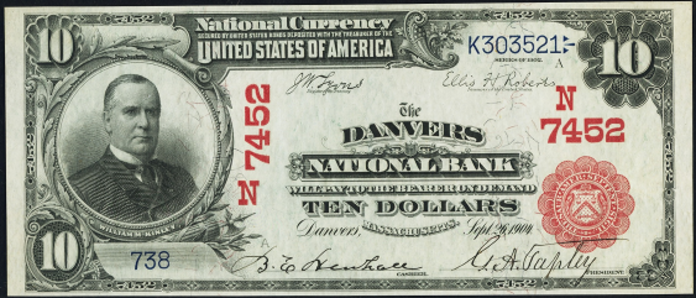Ten Dollar Notes › Nationals › 1902 Ten Dollar National Bank Notes › Pennsylvania Charters › 1902 $10 Schaeffertown Pennsylvania First National Bank
Get Value Now
| Item | Info |
|---|---|
| Series | 1902 |
| Charter | #8962 First National Bank of Schaeffertown, Pennsylvania |
| Year Chartered | 1907, 490 Banks Chartered |
| City Info | Schaefferstown is a census-designated place in Lebanon County, Pennsylvania, United States and is in Heidelberg Township. The population was 984 at the 2000 census. Schaefferstown is one of the oldest towns in Lebanon County, being at least a century older than the county itself. It is the main town in Heidelberg Township. Although the exact date of the first settlers is unknown, it is certain that they settled here before 1725. Those first settlers were German Jews. Many of them were skilled craftmen and traders. They disappeared, however, when non-Jewish German settlers started moving into the area. The old burial ground was situated about a fourth mile south of Tower Hill and almost a hundred yards east of South Market Street in Schaefferstown. The Jewish settlement was known as the Lebanon Trading Post. Source: Wikipedia |
| Similar Cities | City name is unique, no others like it. |
| Seal Varieties | Red, Blue |
| See Also | If your note doesn't match try: 1. 1907 $10 Gold Certificate 2. 1901 $10 Legal Tender 3. 1908 $10 Silver Certificates |
| Other Info | 1. Value depends on notes known for charter, condition and market demand. |
| Neat Fact | Check your note's serial number. Serial #1 notes are valuable, even on common charters. Serial numbers 2-4 are also desirable in some cases. |
No Obligations Offers and Appraisals
Please submit a good photo or scan. It will be identified and evaluated. Understand there may be subtle differences between the image you see above and your note. Signatures, design, markings and note condition will determine the offer price. Notes in Uncirculated or better condition receive the best offers.
Appraisals can be estimated for wholesale and retail prices. Wholesale is what dealers typically pay. Retail is what a collector might pay. Retail is slightly higher in most cases.
Please visit this page for USA Paper Money Reference. Do not treat this page as a reference guide, it is for appraisal and acquisition purposes only.
